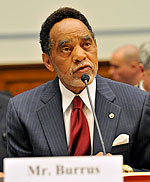Burrus: Postal Decision-Makers Are Off the Mark
July 30, 2009
Saying that he has long been “skeptical” about whether the increased use of electronic communication is to blame for the Postal Service’s economic woes, APWU President William Burrus told lawmakers July 30 that “It is imperative that postal decision-makers correctly identify the cause of the reduction in volume and the trends that will drive future communication.”
“Too often,” Burrus told members of the House subcommittee on Federal Workforce, Postal Service, and the District of Columbia, “decisions are being made with scant appreciation of what will cause volume to increase or decrease.”
 The USPS must respond to the troubled economy, the union president testified, but the cost-reduction programs the Postal Service is pursuing, such as closing facilities and reducing the number of days of delivery, will leave the Postal Service unable to compete when the economy recovers and mail volume returns. Postal executives are making decisions based on an analysis that mail volume will never again reach previous levels, he said.
The USPS must respond to the troubled economy, the union president testified, but the cost-reduction programs the Postal Service is pursuing, such as closing facilities and reducing the number of days of delivery, will leave the Postal Service unable to compete when the economy recovers and mail volume returns. Postal executives are making decisions based on an analysis that mail volume will never again reach previous levels, he said.
“It is important to note,” Burrus said, “that our nation’s mail volume was highest in 2006,” when the economy was strong and the use of electronic communication was already widespread. Of the 213 billion items mailed that year, 190 billion pieces involved business communication, and only 2.9 percent, or 19.4 billion pieces, was sent from one household to another, he noted.
The union president cautioned that strategies based “on the premise that the conversion of hard-copy mail to electronic communication was the cause of declining volume” don’t take into consideration the impact of the economy. “We must keep in mind that the mail stream is — and will continue to be — dominated by business-related communication, which is especially sensitive to the economic environment.”
“The diversion of hard-copy communication has been less affected by electronic conversion than by corporate marketing strategies that focus on the nation’s economic downturn,” he said.
Burrus said the domination by business mail is certain to continue and that mail volume is likely to bounce back. One respected analyst, he pointed out, foresees a 2 percent annual growth rate in mail volume through 2014. “Yet postal management seems to be betting that mail will cease to be relevant.”
“Mail has unique advantages over other commercial messaging, including targeting, attention and retention. I predict that hard-copy mail will be competitive far into the future,” he said, adding that he feared that “initiatives presently under way will leave the Postal Service ill-equipped when mail volume returns commensurate with an economic recovery.”
“Station and branch closings and five-day delivery schemes will unquestionably have a negative effect on the postal monopoly, and will impede the Postal Service’s ability to compete. These are acts of surrender,” Burrus testified, “when the outcome of the battle is still in doubt.”
Also testifying at the hearing were: Rep. Albio Sires (D-NJ), sponsor of H.R. 658, a bill to modify the procedures the U.S. Postal Service must follow in connection with the closing or consolidation of any postal facility; Jordan Small, Acting Vice President, Network Operations, U.S. Postal Service; John Waller, Director, Office of Accountability and Compliance, Postal Regulatory Commission; Phillip Herr, Director, Physical Infrastructure Issues , U.S. States Government Accountability Office; Jerry Cerasale, Senior Vice President, Direct Marketing Association; Art Sackler, Executive Director, National Postal Policy Council; Michael Murphy, President, Japs-Olson Company; John Hegarty, President, National Postal Mail Handlers Union; Louis Atkins, Vice President, National Association of Postal Supervisors; Fred Rolando, President, National Association of Letter Carriers; Don Cantriel, President, National Rural Letter Carriers Association; and Mark Strong, Executive Vice President, National League of Postmasters of the U.S. [Click here for links to their testimony.]



